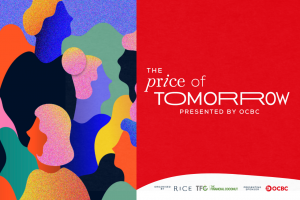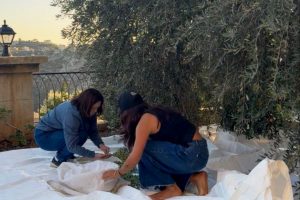All images by Reza Rifaldi for RICE Media
Six speakers walk onto the stage of *SCAPE The Ground Theatre in a single file to an audience of nearly 300. Dressed plainly in monotone T-shirts, jeans, and sneakers, each speaker is slated to read a selected piece from The Gaza Monologues.
These are the heartbreaking testimonies written by young Palestinians in 2010 after the Gaza War. Actors such as Brendon Fernandez, Asnida Daud, Krish Natarajan and more gave weight and gravitas to the words crafted over a decade ago about Israeli occupation.
They’re just as relevant today. With over 31,000 Palestinians killed so far from Israel’s siege since October 7 last year, the massacre sees no end in sight. The frustration is felt across the world and in Parliament, where Foreign Affairs Minister Vivian Balakrishnan noted that Israel’s military operations have “gone too far”. But still, Singapore will not sever diplomatic ties.
If the live readings of the Gaza Monologues prompted poignant reflections on the enduring struggles of Palestinians, the ensuing panel discussion ignited fiery emotions that vividly showcased the volume of frustrations on the ground.

A Polarising Start
Criticism of the Live Gaza Monologues prior to the day itself underscores the issue’s sensitivity. The emergence of a public event discussing Palestinian solidarity in Singapore is even surprising in the first place, given the police investigations into local gatherings related to support for the Palestinian cause.
Promotional posts on social media were inundated with comments that spoke against support for Palestinians and whataboutery (“Why isn’t there Yemen Monologues?”). Even on the pro-Palestinian side, some questioned organisers Lepak Conversations on why the funds raised from the tickets are going to the Red Cross.
But the bulk of the criticism went into the presence of government officials in a community initiative.
Minister of State Alvin Tan was slated to appear on the panel along with Ustazah Shameem Sultanah, who visited Cairo to deliver aid to Palestinian refugees, and actress Oon Shu An, who has been outspoken about the situation in Gaza on her platforms.
The first hiccup was that Mr Tan was unwell on the day and could not attend the event. He was replaced by Mr Janadas Devan, the Director of the Institute of Policy Studies and the Senior Advisor (Government Communications) at the Ministry of Communications and Information.
Though Mr Devan was at the event in his personal capacity, it’s indisputable that most attendees saw him as The Government Representative.

X (formerly Twitter) users pointed out that a state-sanctioned event only legitimises “lip service” from the state. Others expressed concern about the purpose of the discussion if a government representative will simply “parrot government-approved narratives”.
Lepak Conversations and its event partners (including RICE) were accused of being disingenuous and not doing enough for the Palestinian cause to warrant support. Another X user called for those who wanted to attend the event not to do so as a form of protest.
Reacting to the online feedback, Lepak Conversations founder (and former social media manager at RICE) Yulianna Frederika says she was dismayed and disappointed that several prior grassroots events had been hindered.

An application for a peace rally, which was supposed to take place at Hong Lim Park in October last year, was denied. Since then, Singaporean activists have moved online or flown overseas to participate in rallies.
The Live Gaza Monologues had been in the works since December 2023, and its launch was planned even before these grassroots events, she clarifies.
“We feel for the individuals who faced police investigations and had invited some of them to join us as a way to acknowledge their experience and share our space with them should they wish to show their solidarity with us.”
Regarding the polarising reactions to government presence at the event, Yulianna says that at this juncture, partnering with REACH—the Singapore government’s feedback unit—aided the approval process from the relevant authorities.
“We see this as a step forward for the cause as this is the first time the government has endorsed a public pro-Palestinian event in the history of the cause in Singapore,” she adds. The last time a public rally for Palestine had the green light was in 2014 at Hong Lim Park.

“The event was birthed from gathering online sentiments and various community groups voicing the need for a physical space to gather in solidarity for Gaza, following the authority’s rejection of rallies at Hong Lim Park,” Yulianna mentions.
“The purpose of the Live Gaza Monologues has always been clear: to provide a space for Singaporeans to come together in solidarity for Gaza within the constraints we have to work with.”
She adds that while Mr Devan isn’t a political office holder—hence less able to table actionable suggestions or explain certain government actions in detail—his expertise in government communications and decades of journalistic experience still made for a productive discussion.

Agreeing To Disagree
With the panel discussion held under Chatham House Rule, information mentioned in the panel is free to share, although it’s forbidden to reveal who made it. This was to ensure the participants could share their thoughts freely and safely, Lepak Conversations mentioned in an Instagram post ahead of the event.
If activists were ever worried that the dialogue would be a tame, timid affair, they were mistaken. The discussion that ensued was candid, even heated at times.
While it kicked off with a focus on empathy and solidarity, the panel discussion pivoted to public frustration at the government’s response to the conflict thus far. Arguments broke out on stage, and most of the questions from the audience were aimed at Mr Devan—even the queries that might have been more appropriate for someone in the Ministry of Foreign Affairs or the original panellist, Mr Tan, to answer.

It’s almost as if the attendees and panellists wanted clarity from the government. And Mr Devan was the closest they could get.
Why hasn’t the government imposed sanctions on Israel like it did with Russia? Why hasn’t it chastised Israel more strongly for violating international law? Why does it seem like the complexity of the Israel-Palestine issue is being weaponised to stifle nuanced conversations? What went wrong with the whole CCE slides saga?
Indeed, the panel discussion, which stretched over two hours, saw multiple references to “a very complex and involved conflict”.
Panellists spoke of Iran’s hand in Hamas and the United States’ power in reining in Israel. All that to say, in the grand scheme of things, Singapore might not have all that much power to effect change in the world.

At times, the disconnect was apparent. For many in attendance, it wasn’t a complicated issue at all. One participant took to the microphone to ask: “How complex is the issue when it is all about a settler-colonialist mentality?”
Another participant asked a question flashed on screen: “Politics and emotions aside, why can’t people with power just choose humanity?”
The chasm was perhaps the most apparent when the discussion drifted to why local media outlets and the government have yet to officially characterise the conflict in Gaza as a genocide.
Under the United Nation’s Genocide Convention, this is defined as committing acts “with intent to destroy, in whole or in part, a national, ethnical, racial or religious group”. On that matter, the International Court of Justice (ICJ) has said that it is “plausible” that Israel is committing genocide in Gaza. However, ICJ has yet to conclude if Israel is guilty.

For some on the panel, that’s not enough to unequivocally call what’s happening in Gaza a genocide. But when the audience was asked if they thought that Israel is committing genocide, most of the room erupted with a resounding “yes”.
Before the rumblings in the crowd could be addressed, however, it was on to another audience question.
As the panel discussion extended beyond its original 90-minute duration, it became increasingly evident that consensus was unlikely to be reached. Nor were all the concerns in the room going to be addressed.
What resulted, though, was the tiny broadening in perspective one can only experience when they converse with someone with diametrically opposing views.

Of Mixed Reactions
A 27-year-old undergraduate student, who agreed to be interviewed under conditions of anonymity, shared mixed sentiments at the end of the event.
“When I first heard the monologues, I felt very emotional. It really brings you down to see [Palestinian] perspectives, their struggles.”
“Overall, it’s a little bit mixed. In the beginning, we were hoping to find some sense of healing. But I guess towards the end, it grew into frustration. At the same time, it just shows the importance of advocating. More needs to be done to talk about this issue.”

Commenting on the clear tension in the room, 36-year-old Afiq Omar said Mr Devan’s presence was a bit of a “double-edged sword”.
“It’s good because it’s not screaming into a blank wall and there’s no government representative, but it’s not good if the event is focused more on allowing people to vent and the questions are more emotional than problem-solving,” Afiq offers.
On a more positive note, Afiq felt that the event helped him to find solidarity with other Singaporeans who shared his views.
“Sometimes you can feel trapped in a silo. It’s good to see people share the same feelings as me.”

“One thing that could have been improved was to be more open to the audience, for the audience to provide points as well,” a 26-year-old attendee shares, reflecting on how the panel discussion could have gone.
“It [the audience providing points] did happen, but it ended up being a debate instead of actually allying with Palestine. I do have criticisms about the event, but I understand this large-scale event couldn’t be held otherwise in this country,” they add.
Whether positive or negative, attendees RICE spoke to shared the sentiment that more could be done by Singaporeans to support the Palestinian cause. Yulianna felt that the discussion was less constructive than she initially hoped, but she maintained the panel discussion was still worthwhile.
“Beyond intellectual and political discourse, the panel acknowledged the emotions and varying experiences one might have when advocating for the cause—something audiences sorely needed due to the restrictions on public expression of solidarity,” she offers.

A Tiny Step in the Right Direction
As lively as the discussion was, the naysayers correctly predicted that it didn’t do much to move the needle and get the government to change its positions.
That’s not to say that the event—one of the first government-endorsed pro-Palestine events—wasn’t a milestone in its own right. It was still an avenue for hundreds of advocates to gather and air their opinions in the presence of people with power and influence.

“It can get lonely, intimidating or frustrating to advocate for the Palestinian cause given the existing restrictions in Singapore,” Yulianna remarks.
“Ultimately, we want people to walk away from Gaza Monologues knowing they are not alone in their experience. Based on the feedback we’ve received from attendees, this aim seems to have been achieved.”
The event was dismissed by some as futile because of its government endorsement. But that could be too simple a generalisation. It ignores the potential to effect collective change in any shape, degree or form—and the possibility of driving meaningful progress within seemingly resistant systems.
If anything, the Gaza Monologues sent a clear signal: that Singaporeans are capable of, and indeed ready, for nuanced conversations and peaceful assembly. Even amidst disagreement.






